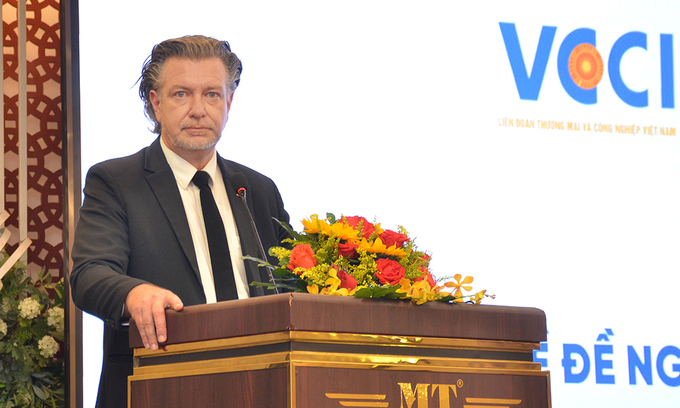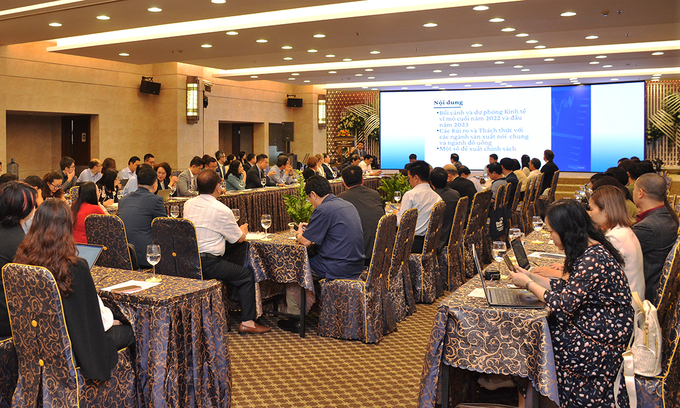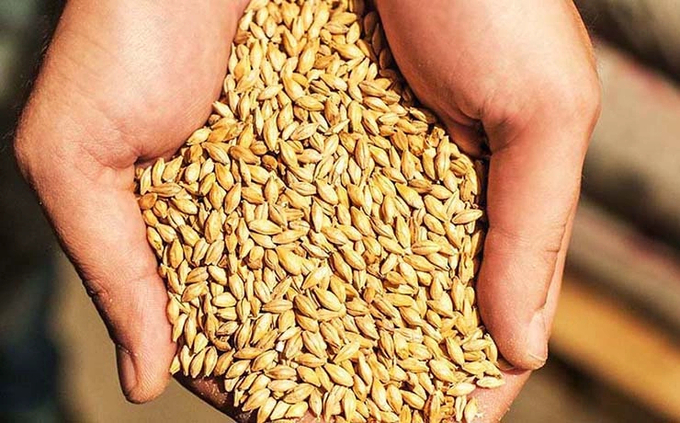June 15, 2025 | 06:46 GMT +7
June 15, 2025 | 06:46 GMT +7
Hotline: 0913.378.918
June 15, 2025 | 06:46 GMT +7
Hotline: 0913.378.918

Mr. Chris Vanloon, Chairman of AmCham giving a speech at the workshop.
The Beverage Industry Workshop was organized on March 15 to discuss the proposal to develop the amended Law on Special Consumption Tax. At the workshop, the American Chamber of Commerce (AmCham) proposed Vietnam's Ministry of Finance to exempt sugary drinks, barley and non-alcoholic beverages from the draft amended Law on Special Consumption Tax.
"The Ministry of Finance needs to weigh the potential impacts of the proposed draft on businesses and consumers against its benefits, and avoid undesirable consequences based on reliable scientific evidence and risk management principles", remarked Mr. Chris Vanloon, President of AmCham.
According to AmCham, the current Vietnamese legal system does not clearly define "sugary drinks". Therefore, the proposal made by the Ministry of Finance may also affect some essential and health products such as milk and dairy products, health food, medical food for the sick, etc.
Approximately a quarter of countries around the world are currently imposing taxes on sugary drinks. This term is frequently confused with another definition called "sugar-added beverage". Several countries, including Denmark, have withdrawn this special consumption tax.
"If this proposal is approved, the entire food and beverage industry, which is still struggling to recover from Covid-19, will face an additional financial burden. It will also pressure many families to pay more for many common food products", AmCham commented.

The Beverage Industry Workshop was organized on the morning of March 15.
The Ministry of Finance requested for comments on Document No. 1585/BTC-VCS dated February 21, 2023 regarding the proposal to develop a draft amended Law on Special Consumption Tax. The draft contained several significant changes, including: Adding sugary drinks, barley drinks and non-alcoholic beverages to the list of products subject to the Special Consumption Tax; Increasing the Special Consumption Tax on alcohol and beer.
During the workshop organized by the Vietnam Beer-Alcohol-Beverage Association (VBA) in collaboration with VCCI, Mr. Nguyen Van Viet, Chairman of VBA said that the beverage industry is directly and extensively affected by the excise Law on Special Consumption Tax.
"Concerns raised by the beverage industry help to ensure that policies and laws reach a high level of consensus, harmonize benefits and ensure sustainable revenue generation for the State budget before they are enacted", added Mr. Viet.
As a bridge connecting businesses and state agencies, VBA hopes that multi-dimensional opinions from the business community, scientists, economic experts, and legal experts will be compiled for study and review by relevant authorities.
On the other hand, Mr. Nguyen Van Viet proposed to postpone the amendment of the Law on Special Consumption Tax until at least between 2023 and 2024 to help businesses stabilize production and recover from the COVID-19 pandemic. There should be a detailed and comprehensive assessment of the impact of the change beforehand, including impacts on the economy; Avoid adding sugary drinks, barley drinks and non-alcoholic beverages to Special Consumption taxable objects.

Barley is one of the most common brewing ingredients.
The Ministry of Health reported that the main cause for obesity is an unbalanced diet, high levels of energy (from both fat, protein, and carbohydrates); and lack of physical activity.
Consequently, some participants at the workshop suggested: The most effective way to control obesity is to educate and help people balance their diet, and increase physical activity instead of amending the Law on Special Consumption Tax. The amended Law can lead to conflicts with the Government's effort to encourage manufacturers to develop advanced solutions and create low-alcohol or alcohol-free products.
The Beverage Subcommittee explained that there is not enough scientific and practical evidence to prove that the imposition of Special Consumption Tax on sugary drinks will help reduce overweightness and obesity, especially when there are many types of food containing high sugar and calorie content on the market.
Some countries such as Thailand, India, Norway, Finland, and Mexico reported that overweightness and obesity rates are on a rapid increase, despite the introduction of taxes on sugary drinks. Additionally, this policy will affect multiple industries such as beverage, sugar cane, retail, packaging as well as the entire economy.
"We hope that the Government and the National Assembly will thoroughly consider this proposal based on science and practice to ensure fairness, for the benefit of the people and businesses".
The proposal to expand the inclusion of non-alcoholic beverages to the Special Consumption taxable category is likely to reduce the incentive to invest and innovate in low-alcohol or non-alcoholic products, even at lower tax rates. Changing consumption habits is a challenging and extensive process, that would be significantly more difficult without the support of appropriate policies.
In the draft, the Ministry of Finance defined "barley drink" as a product similar to non-alcoholic beer because it has the same ingredients, process, appearance and taste as beer, so it needs to be levied a special consumption tax. VBA believes that these same factors are not a legal basis for imposing a special consumption tax, because this tax aims to discourage the consumption of products that are harmful to health.
The Law on Special Consumption Tax has been revised five times since 2003. The constant adjustment destabilizes the legal, institutional and business environment, directly impacting businesses, according to VBA. Furthermore, tax increases do not solve problems such as increasing budget revenue; illegal alcohol, which accounts for between 60 to 70% of the market, causing a loss of 751 million USD every year.
Translated by Nguyen Hai Long

(VAN) The UNESCO Global Geopark revalidation of Non nuoc Cao Bang and the transition to a two-tier administrative model are presently undergoing a pivotal moment in Cao Bang, the northernmost province of Vietnam.
/2025/06/13/5330-2-004539_953.jpg)
(VAN) Changing policy mindset and removing investment barriers are urgent requirements to open up new development space for enterprises in the agricultural sector.

(VAN) The areas include the restoration of five million hectares of marine ecosystems.

(VAN) Dr. Le Van Nguyen, Director of the Institute of E-Commerce Management (ECM), emphasizes the potential for green development through the cultivation of fruit trees, particularly in provinces such as Son La.

(VAN) VAAS and numerous Vietnamese enterprises have signed cooperation agreements with Japanese partners to promote agricultural technology and trade connectivity.
/2025/05/29/5625-12-214801_567.jpg)
(VAN) Provincial mergers in the Mekong Delta promise to streamline administration, expand inter-provincial raw material areas, and foster close linkages in agricultural value chains, benefiting both businesses and cooperatives.

(VAN) Merging Mekong Delta provinces contributes to the expansion of agricultural raw material areas, addressing previous constraints caused by provincial boundaries. Additionally, this expansion will reduce costs and strengthen linkages between businesses, cooperatives, and farmers.